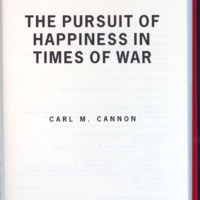-
Title
-
The pursuit of happiness in times of war
-
Description
-
In The Pursuit of Happiness in Times of War, Pulitzer Prize-winning journalist Carl M. Cannon shows how the single phrase life, liberty, and the pursuit of happiness" is one of remarkable historical power. From the Revolutionary War to the War on Terrorism, Americans have lived out this creed with the help of their elected leaders, who in times of conflict inevitably hark back to Jefferson's exalted language.Cannon traces the roots of "the pursuit of happiness" and explores how wartime presidents have embraced it for two centuries. He draws on original research and interviews with Presidents Ford, Carter, Bush (41), and Clinton, among others, and has uncovered exactly what this phrase means to these presidents.Cannon charts how Americans' understanding of the pursuit of happiness has changed through the years as the nation itself has changed."--Jacket.
-
Identifier
-
1139254
-
742525910
-
Creator
-
Cannon, Carl M
-
Source
-
Brian Lamb Booknotes Collection
-
Gift of Brian Lamb, 2011.
-
Catalog record
-
Language
-
eng
-
Date
-
2004
-
Program air date: Deember 28, 2003
-
Publisher
-
Rowman & Littlefield
-
George Mason University. Libraries. Special Collections & Archives
-
Text
-
Transcription of Annotations
Extensive notes on front and back end papers, half-title concerning information found in the author's epilogue, the origin of the 'pursuit of happiness' phrase in the Declaration of Independence, casualty numbers from the Civil War and World War II, President Wilson's 'ambivalence' to the Declaration of Independence, President Carter, slavery, the use of the Thomas Jefferson's preamble to the Declaration by politicians, reformers, activists, and writers, as well as the link between democracy, capitalism, and the pursuit of happiness. Lamb asks "What is happiness - when did we start pursing it? Have we found it? What proof is there: Who is the happiest person you know?" Annotations by Brian Lamb in the margins and underlining of pertinent phrases throughout the book. Examples: "nation a 'living thing'" and "FDR galvanized the country," and "Bush on Auschwitz." Extra emphasis is given to the following text: "The rub, for some people, is that there are great profits to be made in this pursuit. But capitalism isn't democracy's embarrassing by-product. It is the engine that makes democracy possible, although with it comes materialism in all its forms, many of them rampant and unseemly."
-
Subject
-
"Iraq War, 2003-2011."
-
"National characteristics, American."
-
"Civil rights--United States--History."
-
Relation
-
Original Booknotes interview
-
Booknotes Oral History Project interview
-
Rights
-
This work may be protected by copyright laws and is provided for educational and research purposes only. Any infringing use may be subject to disciplinary action and/or civil or criminal liability as provided by law. If you believe that you are the rights-holder and object to Mason’s use of this image, please contact speccoll@gmu.edu.
 1139254.pdf
1139254.pdf